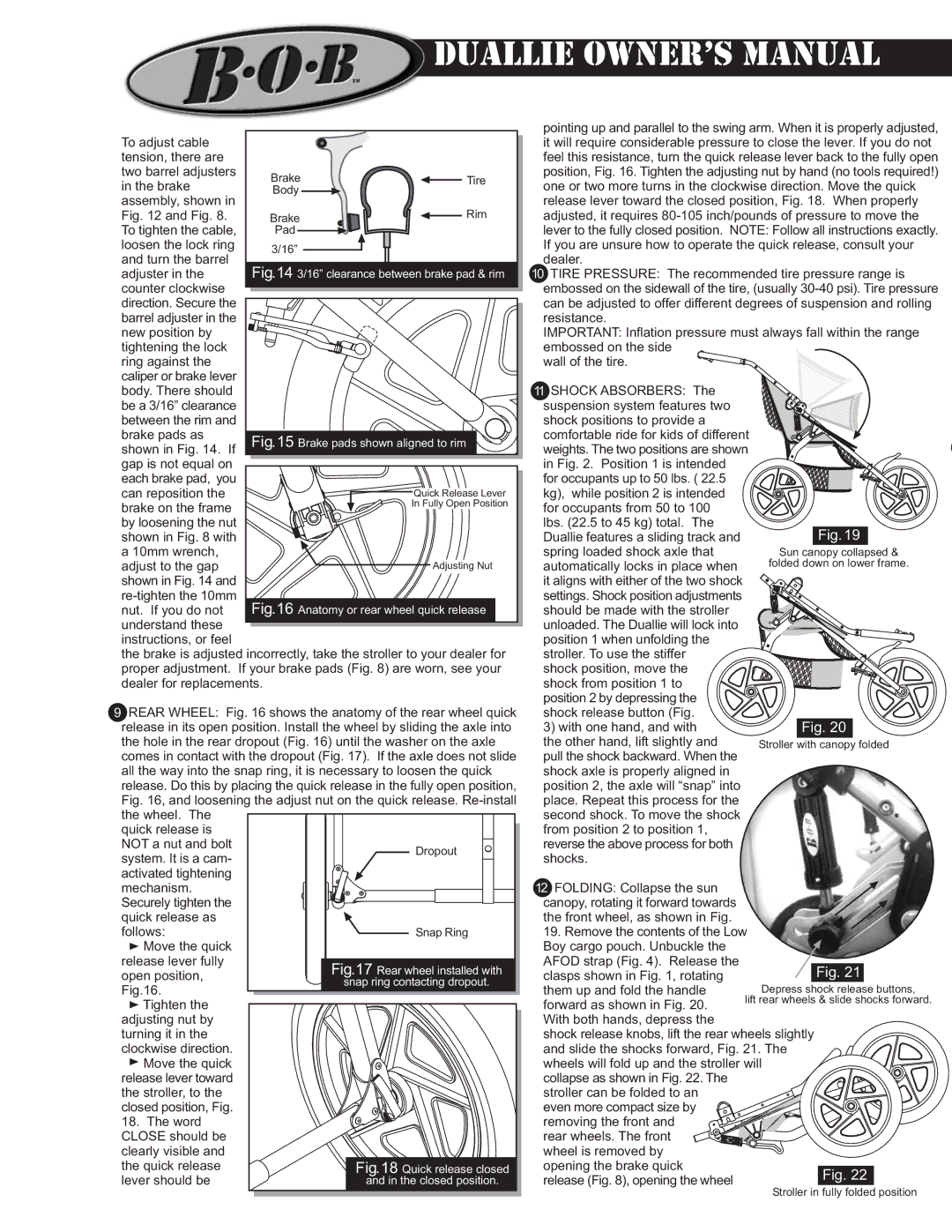
DUALLIE OWNER’S MANUAL
To adjust cable tension, there are
two barrel adjusters
in the brake assembly, shown in
Fig. 12 and Fig. 8. To tighten the cable,
loosen the lock ring and turn the barrel
adjuster in the counter clockwise direction. Secure the barrel adjuster in the new position by tightening the lock ring against the caliper or brake lever body. There should be a 3/16” clearance between the rim and brake pads as shown in Fig. 14. If gap is not equal on each brake pad, you can reposition the
brake on the frame by loosening the nut
shown in Fig. 8 with a 10mm wrench, adjust to the gap shown in Fig. 14 and re-tighten the 10mm nut. If you do not understand these instructions, or feel
the brake is adjusted incorrectly, take the stroller to your dealer for proper adjustment. If your brake pads (Fig. 8) are worn, see your dealer for replacements.
9REAR WHEEL: Fig. 16 shows the anatomy of the rear wheel quick release in its open position. Install the wheel by sliding the axle into the hole in the rear dropout (Fig. 16) until the washer on the axle comes in contact with the dropout (Fig. 17). If the axle does not slide all the way into the snap ring, it is necessary to loosen the quick release. Do this by placing the quick release in the fully open position, Fig. 16, and loosening the adjust nut on the quick release. Re-install the wheel. The
quick release is
NOT a nut and bolt system. It is a cam- activated tightening mechanism.
Securely tighten the quick release as follows:
 Move the quick release lever fully open position, Fig.16.
Move the quick release lever fully open position, Fig.16.
 Tighten the adjusting nut by turning it in the clockwise direction.
Tighten the adjusting nut by turning it in the clockwise direction.
 Move the quick release lever toward the stroller, to the closed position, Fig.
Move the quick release lever toward the stroller, to the closed position, Fig.
18.The word
CLOSE should be clearly visible and
the quick release | Fig.18 Quick release closed |
lever should be | and in the closed position. |
pointing up and parallel to the swing arm. When it is properly adjusted, it will require considerable pressure to close the lever. If you do not feel this resistance, turn the quick release lever back to the fully open position, Fig. 16. Tighten the adjusting nut by hand (no tools required!) one or two more turns in the clockwise direction. Move the quick release lever toward the closed position, Fig. 18. When properly adjusted, it requires
10TIRE PRESSURE: The recommended tire pressure range is embossed on the sidewall of the tire, (usually
IMPORTANT: Inflation pressure must always fall within the range embossed on the side
wall of the tire.
11 SHOCK ABSORBERS: The suspension system features two shock positions to provide a comfortable ride for kids of different weights. The two positions are shown in Fig. 2. Position 1 is intended for occupants up to 50 lbs. ( 22.5 kg), while position 2 is intended for occupants from 50 to 100
lbs. (22.5 to 45 kg) total. The Duallie features a sliding track and spring loaded shock axle that automatically locks in place when it aligns with either of the two shock settings. Shock position adjustments should be made with the stroller unloaded. The Duallie will lock into position 1 when unfolding the stroller. To use the stiffer
shock position, move the shock from position 1 to position 2 by depressing the shock release button (Fig.
3) with one hand, and with the other hand, lift slightly and pull the shock backward. When the shock axle is properly aligned in position 2, the axle will “snap” into place. Repeat this process for the second shock. To move the shock from position 2 to position 1, reverse the above process for both shocks.
12 FOLDING: Collapse the sun canopy, rotating it forward towards
the front wheel, as shown in Fig.
19. Remove the contents of the Low
Boy cargo pouch. Unbuckle the AFOD strap (Fig. 4). Release the
clasps shown in Fig. 1, rotating them up and fold the handle forward as shown in Fig. 20. With both hands, depress the
shock release knobs, lift the rear wheels slightly and slide the shocks forward, Fig. 21. The wheels will fold up and the stroller will collapse as shown in Fig. 22. The
stroller can be folded to an
even more compact size by removing the front and
rear wheels. The front wheel is removed by
opening the brake quick
release (Fig. 8), opening the wheel
